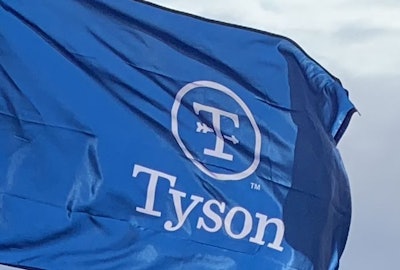
Tyson Foods is cutting jobs, eliminating about 15% of the company’s senior leadership roles and 10% of corporate roles, CEO Donnie King notified employees in a memo on April 26.
“This is not an easy day, and we recognize it will be difficult for our team members,” King wrote. “While this will require time to process, these decisions are necessary to continue executing our long-term strategy and over time will make Tyson Foods stronger.
According to an email sent to WATT Global Media, this decision is part of the previously announced long-term strategy, intended to focus on operational excellence. A copy of King’s memo was attached to that email.
Describing the process as “rightsizing,” King said these changes will enable the company to focus on fewer initiatives with greater intensity, while removing the duplication of work.
King stated that discussions with most of the employees affected by this decision will be held this week, and that all decisions will be implemented in accordance with all local requirements.
“Our team members remain at the heart of everything we do, and we are committed to providing resources and support to those affected,” a Tyson Foods spokesperson said in the email.
Simplifying the business structure
While the memo pointed out different ways Tyson has executed its long-term strategy, King stated that in order to fully realize opportunities that lie ahead, the company must continue to align priorities to enable long-term success, focusing on fundamentals and capitalizing on opportunities and technology.
He continued, stating that in order to best align with its customers’ and consumers’ needs, the staff needs the empowerment to make decisions at the right level with speed, collaboration and agility. The following ways that can be accomplished include:
- Moving sales activities under the business and the growth team
- Moving automation operations into the engineering team
- Moving continuous improvement and standards into the business units to be closer to execution and more aligned with the needs of operations
- Consolidating regulatory labeling and food safety quality authority operations
Recent corporate changes
While it was not announced which positions would be eliminated, Tyson Foods has already undergone numerous changes in senior leadership personnel during the past year.
Among those include:
- Stewart Glendinning was moved out of the chief financial officer role and named as the Prepared Foods group president. John R. Tyson, previously the chief sustainability officer, was promoted to the CEO’s position. Noelle O’Mara, who preceded Glendinning in the Prepared Foods role, left the company.
- Chris Langholz left the company as the president of Tyson’s international business, with his role being filled by Amy Tu, who had been the company’s executive vice president, chief legal officer and secretary, global governance & corporate affairs.
- Scott Spradley, chief technology officer, left the company. After his duties were shared by team members on an interim basis, that job eventually went to Danyel Bischof.
- Brady Stewart was hired to succeed Shane Miller, who resigned as the president of Tyson Fresh Meats.
- David Bray departed as the Poultry group president, and he was succeeded by Wes Morris.
In another corporate move, Tyson Foods announced that it would close its corporate offices in Chicago and Downers Grove, Illinois, and Dakota Dunes, South Dakota, and consolidate those offices into Springdale, Arkansas, where the company is headquartered.
Most recently, Tyson announced it was closing its processing, broiler and hatching operations in Glen Allen, Virginia, and its poultry processing plant in Van Buren, Arkansas.



















